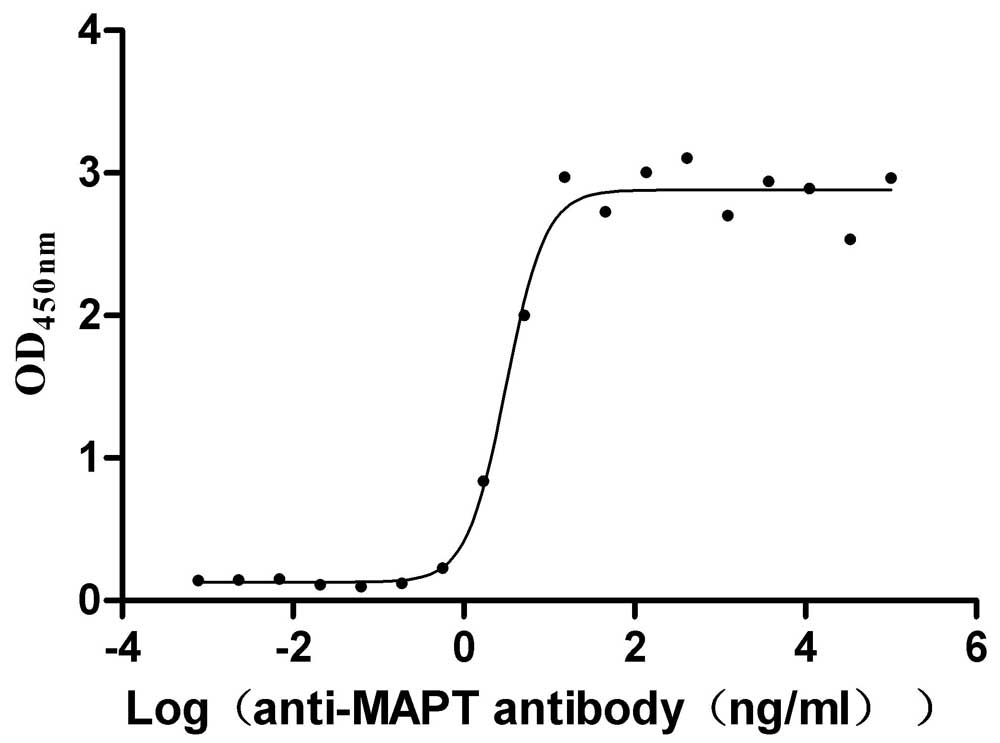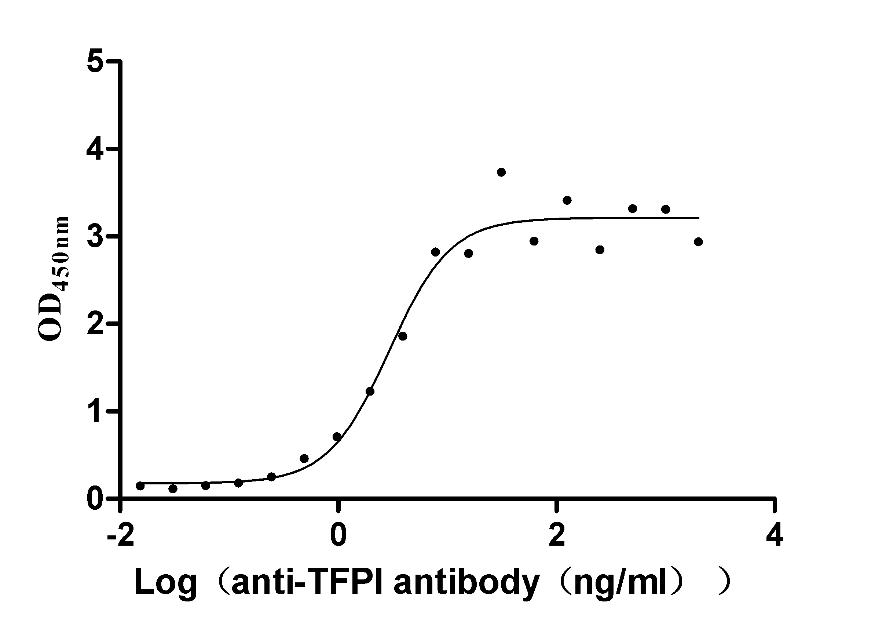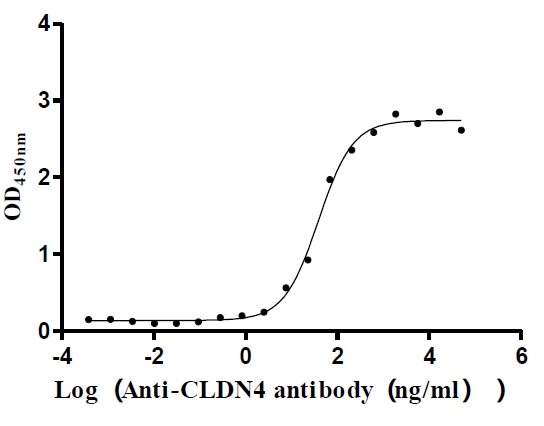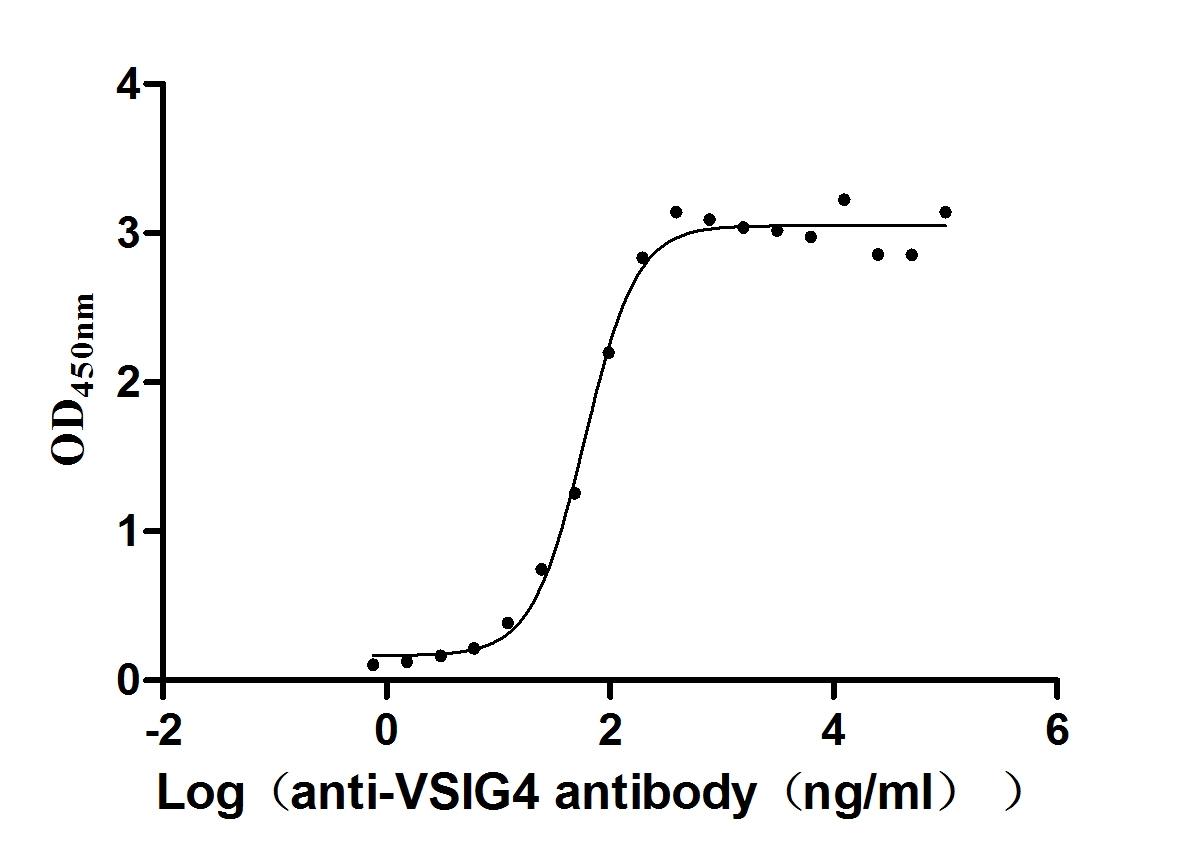Recombinant Mouse Forkhead box protein J1 (Foxj1)
-
货号:CSB-YP733792MO
-
规格:
-
来源:Yeast
-
其他:
-
货号:CSB-EP733792MO
-
规格:
-
来源:E.coli
-
其他:
-
货号:CSB-EP733792MO-B
-
规格:
-
来源:E.coli
-
共轭:Avi-tag Biotinylated
E. coli biotin ligase (BirA) is highly specific in covalently attaching biotin to the 15 amino acid AviTag peptide. This recombinant protein was biotinylated in vivo by AviTag-BirA technology, which method is BriA catalyzes amide linkage between the biotin and the specific lysine of the AviTag.
-
其他:
-
货号:CSB-BP733792MO
-
规格:
-
来源:Baculovirus
-
其他:
-
货号:CSB-MP733792MO
-
规格:
-
来源:Mammalian cell
-
其他:
产品详情
-
纯度:>85% (SDS-PAGE)
-
基因名:Foxj1
-
Uniprot No.:
-
别名:Foxj1; Hfh4Forkhead box protein J1; Hepatocyte nuclear factor 3 forkhead homolog 4; HFH-4
-
种属:Mus musculus (Mouse)
-
蛋白长度:full length protein
-
表达区域:1-421
-
氨基酸序列MAESWLRLCG AGPGEEAGPE GGMEEPDALD DSLTSLQWLQ EFSILNAKAP TLPPGGTDPH GYHQVPGLVA PGSPLAADPA CLGQPHTPGK PTSSCTSRSA PPGLQAPPPD DVDYATNPHV KPPYSYATLI CMAMQASKAT KITLSAIYKW ITDNFCYFRH ADPTWQNSIR HNLSLNKCFI KVPREKDEPG KGGFWRIDPQ YAERLLSGAF KKRRLPPVHI HPAFARQASQ EPSAAPWGGP LTVNREAQQL LQEFEEATGE GGWGTGEGRL GHKRKQPLPK RVAKVLRPPS TLLLTQEEQG ELEPLKGNFD WEAIFEAGAL GEELSSLEGL ELSPPLSPSS HGDVDLTVHG RHINCPATWG PPAEQAADSL DFDETFLATS FLQHPWDESG SGCLPPEPIF EAGDATLAAD LQDWASVGAF L
-
蛋白标签:Tag type will be determined during the manufacturing process.
The tag type will be determined during production process. If you have specified tag type, please tell us and we will develop the specified tag preferentially. -
产品提供形式:Lyophilized powder
Note: We will preferentially ship the format that we have in stock, however, if you have any special requirement for the format, please remark your requirement when placing the order, we will prepare according to your demand. -
复溶:We recommend that this vial be briefly centrifuged prior to opening to bring the contents to the bottom. Please reconstitute protein in deionized sterile water to a concentration of 0.1-1.0 mg/mL.We recommend to add 5-50% of glycerol (final concentration) and aliquot for long-term storage at -20℃/-80℃. Our default final concentration of glycerol is 50%. Customers could use it as reference.
-
储存条件:Store at -20°C/-80°C upon receipt, aliquoting is necessary for mutiple use. Avoid repeated freeze-thaw cycles.
-
保质期:The shelf life is related to many factors, storage state, buffer ingredients, storage temperature and the stability of the protein itself.
Generally, the shelf life of liquid form is 6 months at -20°C/-80°C. The shelf life of lyophilized form is 12 months at -20°C/-80°C. -
货期:Delivery time may differ from different purchasing way or location, please kindly consult your local distributors for specific delivery time.Note: All of our proteins are default shipped with normal blue ice packs, if you request to ship with dry ice, please communicate with us in advance and extra fees will be charged.
-
注意事项:Repeated freezing and thawing is not recommended. Store working aliquots at 4°C for up to one week.
-
Datasheet :Please contact us to get it.
靶点详情
-
功能:Transcription factor specifically required for the formation of motile cilia. Acts by activating transcription of genes that mediate assembly of motile cilia, such as CFAP157. Binds the DNA consensus sequences 5'-HWDTGTTTGTTTA-3' or 5'-KTTTGTTGTTKTW-3' (where H is not G, W is A or T, D is not C, and K is G or T). Activates the transcription of a variety of ciliary proteins in the developing brain and lung.
-
基因功能参考文献:
- Non stem- and progenitor-like responses of Foxj1+ ependymal cells to injury and stroke remain to be defined and investigated. PMID: 29379049
- Our findings provide clues regarding the role of FOXJ1 as a tumor inducer in bladder cancer and an enhancer in glycolysis. Targeting FOXJ1 could be a potential therapeutic strategy in bladder cancer. PMID: 29129693
- genome-wide expression profiles of undifferentiated E14.5 vs. abundantly ciliated E18.5 micro-dissected airway epithelia as well as Foxj1(+) vs. Foxj1-deficient foetal (E16.5) lungs of the mouse were compared using microarray hybridisation. PMID: 27914912
- p73 drives multiciliogenesis, both through transcriptional activation of a master ciliogenesis transcription factor FoxJ1 and through regulation of multiple genes central to ciliogenesis. PMID: 26988441
- MYB has an early, crucial and conserved role in multiciliogenesis, and it promotes a novel S-like phase in which centriole amplification occurs uncoupled from DNA synthesis, and then drives later steps of multiciliogenesis through induction of Foxj1. PMID: 24048590
- noto and foxj1 have roles in node formation, nodal ciliogenesis and cilia positioning PMID: 22357932
- we found that Ank3 expression is controlled by Foxj1, a transcriptional regulator of multicilia formation. PMID: 21745638
- For the first time, our study identifies the time- and region-specific activity of a perinatal progenitor domain that is required for transition and progression of OB neurogenesis from the embryonic-to-postnatal periods. PMID: 21697387
- Data show that floor plate identity and ciliogenesis are unaffected in mouse embryos lacking Foxj1 and we provide evidence that additional transcription factors expressed in the floor plate share overlapping functions with Foxj1. PMID: 21098568
- foxj1 functions in late-stage ciliogenesis to regulate programs promoting basal body docking and axoneme formation in cells previously committed to the ciliated cell phenotype. PMID: 12818891
- role in the regulation of T cell activation and autoreactivity; Foxj1 likely modulates inflammatory reactions and prevents autoimmunity by antagonizing proinflammatory transcriptional activities PMID: 14963332
- Foxj1 regulates basal body anchoring to the cytoskeleton of ciliated pulmonary epithelial cells. PMID: 14996907
- Asymmetric gene expression during left-right axis patterning occurs in Foxj1 knockout mice. PMID: 15504371
- Foxj1 restrains B cell activation and the maturation of humoral responses in vivo. PMID: 16002694
- These results indicate that a random signal of laterality (Foxj1) is dominant over the reversal signal of laterality (Inv). PMID: 16325766
- Murine cytomegalovirus influences Foxj1 expression, ciliogenesis, and mucus plugging in mice with allergic airway disease. PMID: 18258850
- FoxJ1 playes role in in oro-facial morphogenesis. PMID: 18723525
- foxj1 is expressed specifically in the embryonic node throughout the developmental window critical for left-right patterning. PMID: 19165828
- Foxj1-dependent gene expression is required for differentiation of radial glia into ependymal cells and a subset of astrocytes in the postnatal brain. PMID: 19906869
- Foxj1 is most abundantly expressed in tissues rich in highly ciliated cells, such as olfactory sensory neurons, and is predicted to be important to cilia. PMID: 17971504
显示更多
收起更多
-
亚细胞定位:Nucleus.
-
蛋白家族:FOXJ1 family
-
组织特异性:Predominantly expressed in tissues containing motile cilia.
-
数据库链接:
KEGG: mmu:15223
STRING: 10090.ENSMUSP00000038351
UniGene: Mm.378938
Most popular with customers
-
Recombinant Human Tumor necrosis factor receptor superfamily member 1A (TNFRSF1A), partial (Active)
Express system: Mammalian cell
Species: Homo sapiens (Human)
-
Recombinant Human Tumor necrosis factor ligand superfamily member 9 (TNFSF9), partial (Active)
Express system: Mammalian cell
Species: Homo sapiens (Human)
-
Recombinant Human Claudin-18.2 (CLDN18.2)-VLPs (Active)
Express system: Mammalian cell
Species: Homo sapiens (Human)
-
Recombinant Macaca mulatta Microtubule-associated protein tau (MAPT) (Active)
Express system: Mammalian cell
Species: Macaca mulatta (Rhesus macaque)
-
Recombinant Rabbit Tissue factor pathway inhibitor (TFPI) (Active)
Express system: Mammalian cell
Species: Oryctolagus cuniculus (Rabbit)
-
Recombinant Human Zymogen granule protein 16 homolog B (ZG16B) (Active)
Express system: Mammalian cell
Species: Homo sapiens (Human)
-
Recombinant Human Claudin-4 (CLDN4)-VLPs (Active)
Express system: Mammalian cell
Species: Homo sapiens (Human)
-
Recombinant Human V-set and immunoglobulin domain-containing protein 4 (VSIG4), partial (Active)
Express system: Mammalian cell
Species: Homo sapiens (Human)


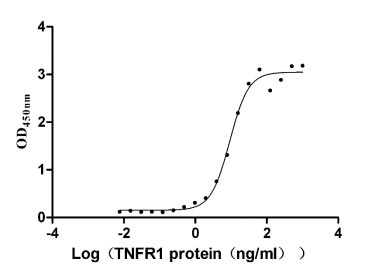
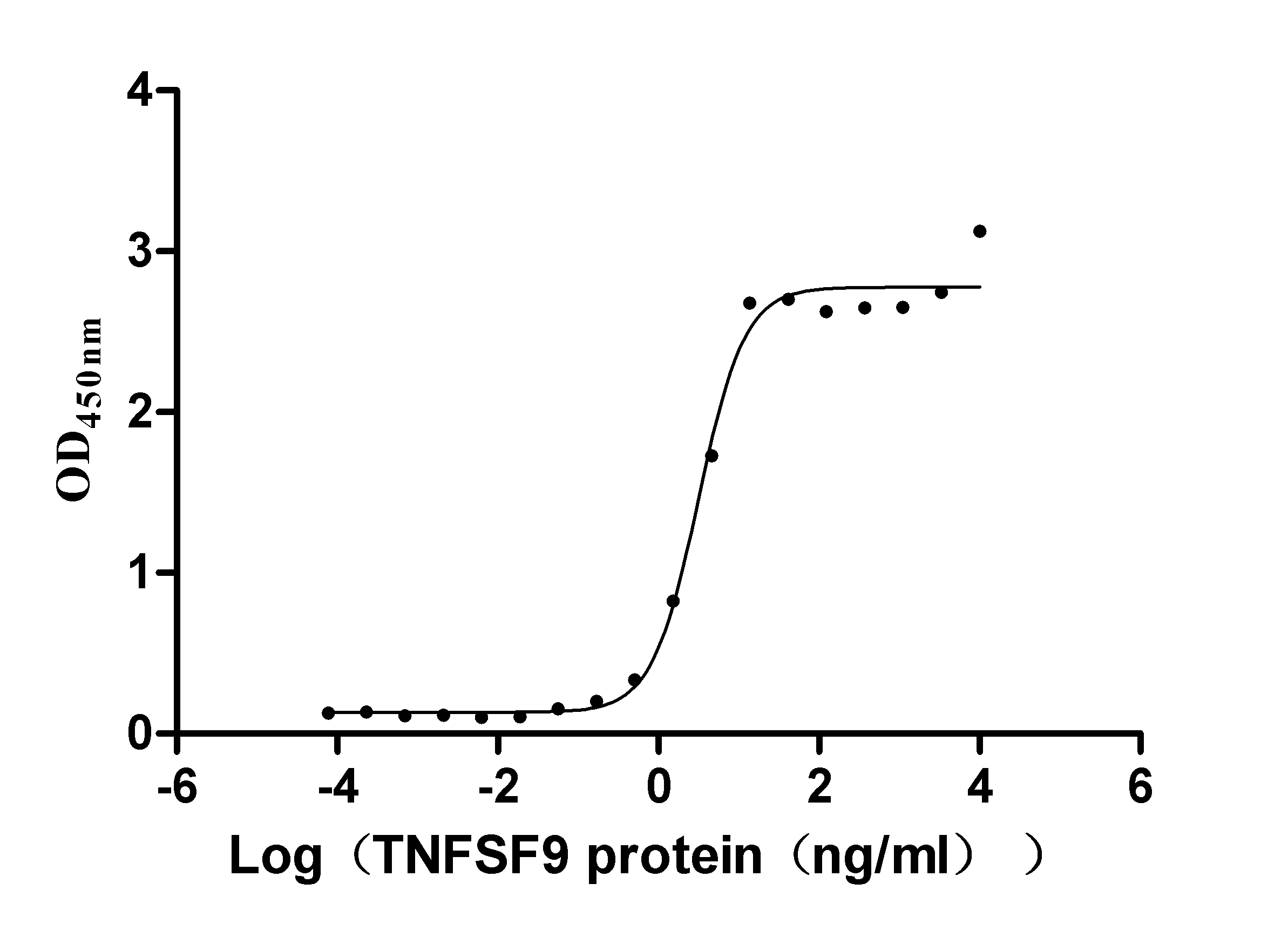
-AC1.jpg)
